(Reuters) - Charles Schwab (NYSE:SCHW)'s fourth-quarter profit fell 47% as bigger interest payments on its client deposits and debt dented gains from a jump in asset management fees, the brokerage reported on Wednesday.
The U.S. Federal Reserve's aggressive rate hikes have been a drag on financial firms like Schwab, which primarily rely on clients' deposits and uninvested cash balances to buy bonds and give loans.
Schwab, like major banks, has been dangling higher interest rates to avoid depositors from seeking better returns elsewhere. It paid an average rate of 1.37% on deposits, compared to 0.46% a year earlier.
To supplement its funding sources, Schwab had also borrowed from the Federal Home Loan Bank in the first half of 2023. It paid an interest of $423 million on those loans, four times higher than the year earlier.
The moves eroded Schwab's net interest revenue, which fell 30% to $2.13 billion in the fourth quarter ended Dec. 31.
The pace of reallocation by clients has been decelerating, however, and the pressure to raise deposit rates further is also easing amid rising bets that the Fed will likely cut interest rates.
Asset management and administration fees, earned from managing mutual funds and exchange-traded funds, jumped 18% to $1.24 billion as client assets reached a record.
The Westlake, Texas-based company reported a profit of $1.05 billion, or 51 cents per share, compared to $1.97 billion, or 97 cents per share, a year earlier.
Shares rose 1.2% in trading before the bell. They declined 17% in 2023, compared with the S&P 500 index's just over 24% gain.

Schwab is currently trading at the equivalent of around 17 times expected earnings over the next 12 months.
Some analysts expect it to move back to its historical 18-20 times expected earnings multiple, largely due to the company's cost-cuts over the past year.
